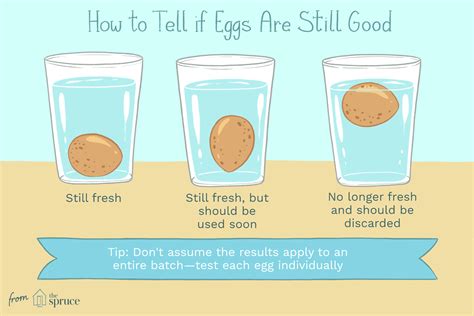How to Tell If An Egg Is Good: Simple Tests and Smart Storage
Knowing whether an egg is fresh is crucial for food safety and achieving the perfect culinary results. A bad egg can ruin a dish and, more importantly, cause foodborne illness. Luckily, there are several easy ways to check the freshness of an egg before you even crack it open. This guide will walk you through simple tests and smart storage techniques to ensure you're always using the freshest eggs possible.
The Float Test: A Quick and Easy Check
This is arguably the most well-known method. Simply place your egg in a bowl of cold water.
- Egg sinks and lies flat: Congratulations! Your egg is fresh and ready to use.
- Egg sinks but stands on one end: The egg is still usable, but it's getting older. Use it soon.
- Egg floats: Do not use this egg. It's old and likely spoiled. Discard it immediately.
Why does this work? As an egg ages, the air sac inside it grows larger. A larger air sac makes the egg less dense, causing it to float.
The Crack and Smell Test: A More Definitive Answer (But Destructive!)
This method is more definitive but means you'll need to crack the egg to perform the test.
- Crack the egg into a bowl: Carefully crack the egg into a bowl.
- Inspect the white and yolk: Fresh egg whites will be firm and stand tall. The yolk will be round and high-domed. Older eggs will have flatter, runnier whites and flatter yolks.
- Smell the egg: A fresh egg should have little to no odor. A foul smell indicates spoilage. Do not consume an egg with a foul odor.
Beyond the Tests: Proper Egg Storage for Maximum Freshness
Even the freshest eggs will spoil eventually. Proper storage is key to maximizing their shelf life.
Refrigerate Immediately: Always refrigerate eggs immediately after purchase.
Keep them in their carton: The carton helps protect the eggs from absorbing odors and keeps them stable.
Large end up: Storing eggs with the large end up helps keep the yolk centered and reduces the risk of spoilage.
Use by dates are guidelines: While helpful, "use by" dates are not foolproof indicators of freshness. Always perform one of the tests above if you're unsure.
Common Myths about Egg Freshness Debunked
Let's address some common misconceptions:
- Myth: Cracking an egg onto a cold surface will tell you if it's fresh. Fact: This is unreliable. The consistency of the egg white is a better indicator.
- Myth: You can tell if an egg is fresh by its shell color. Fact: Shell color is determined by the breed of hen, not the egg's freshness.
Conclusion: Fresh Eggs, Happy Cooking
By using these simple tests and following proper storage techniques, you can easily determine if your eggs are fresh and avoid any potential food safety issues. Remember, when in doubt, throw it out! Using fresh eggs will enhance the flavor and texture of your dishes, leading to more enjoyable and successful cooking experiences.
